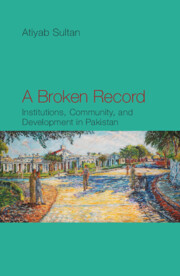Book contents
- Frontmatter
- Contents
- List of Figures
- List of Tables
- Preface
- Acknowledgements
- Introduction: Institutions, Debt, and the Deadweight of History, Punjab c. 1900–47
- 1 Glass Half Full?: Two Views of the Punjab
- 2 An Alternative Economic History of the Punjab
- 3 Combating Indebtedness I: Laws and Institutions
- 4 Combating Indebtedness II: Community Development in Colonial Punjab
- 5 The Bureaucrat’s Burden: Tales of Reform and Development
- 6 Colonialism and the Discourse on Development
- Postscript
- Glossary
- Bibliography
- Index
3 - Combating Indebtedness I: Laws and Institutions
Published online by Cambridge University Press: 27 September 2022
- Frontmatter
- Contents
- List of Figures
- List of Tables
- Preface
- Acknowledgements
- Introduction: Institutions, Debt, and the Deadweight of History, Punjab c. 1900–47
- 1 Glass Half Full?: Two Views of the Punjab
- 2 An Alternative Economic History of the Punjab
- 3 Combating Indebtedness I: Laws and Institutions
- 4 Combating Indebtedness II: Community Development in Colonial Punjab
- 5 The Bureaucrat’s Burden: Tales of Reform and Development
- 6 Colonialism and the Discourse on Development
- Postscript
- Glossary
- Bibliography
- Index
Summary
They realise at last that change does not mean reform, that change does not mean improvement.
—Frantz Fanon, The Wretched of the EarthThe link between the formalization of property rights and access to credit has been the subject of serious academic inquiry in recent decades. Perhaps most notably, the Peruvian economist Hernando de Soto has analysed the relationship between the two in post-colonial and fragile contexts. However, the debate has a much longer history of informing policy, especially in colonial contexts where the desire to increase revenue collection by the colonial power hinged on the prior registration of property. The fact that this formalization of property rights also enabled experiments involving access to credit in the Punjab is a later development, and one that echoes in scholarship such as de Soto's till today.
In the Punjab, the architecture for combating indebtedness had two major parts: legal changes and reform initiatives. This chapter interrogates the legal and institutional changes starting with the Punjab Alienation of Land Act of 1900. It then discusses the various pieces of legislation pushed by the Punjab Unionist Party, especially in the period 1937–46 which came to be known as the period of ‘golden laws’. By critically evaluating the preoccupation with indebtedness, it shows how the issue was a convenient one to focus on. It begins by discussing some of the theoretical literature on institutions to allow a full appreciation of the impact of these legal changes.
Institutions and Economic Development
In his seminal work on institutions and institutional change, the economic historian Douglass North defined institutions as humanly devised constraints that structure political, economic, and social interactions, and are a primary determinant of the economic performance of a state. The extensive social and economic engineering in the Punjab meant that the administrative or institutional structure in the province was in large part constructed by the British. It is therefore possible to question some theories of institutional development that posit that colonial institutions are responsible for long-run underdevelopment, by examining the history of the Punjab. In particular, the ideas of institutional theorists who believe that secure property rights and cheap credit must be the foundations of a sustained strategy of economic reform can be tested.
- Type
- Chapter
- Information
- A Broken RecordInstitutions, Community and Development in Pakistan, pp. 39 - 74Publisher: Cambridge University PressPrint publication year: 2022



